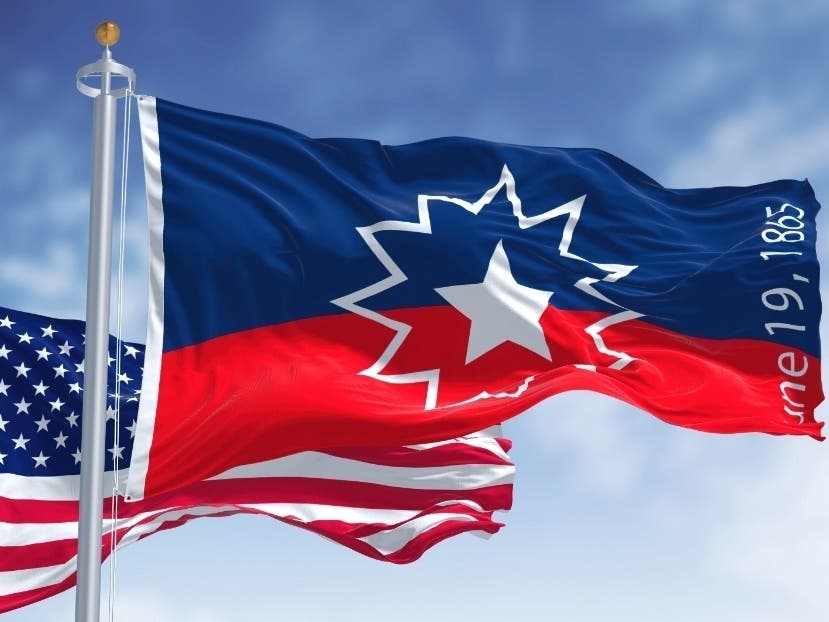Seasonal & Holidays
When Is Juneteenth? What To Know About Holiday Marking Slavery’s End
Juneteenth, a federal holiday since 2021, commemorates the date in 1865 when enslaved people in Texas finally learned that they were free.

ACROSS AMERICA — The Juneteenth observance of the end of the U.S. institution of slavery will be widely celebrated as a federal holiday Wednesday for only the third time, though it has been an important holiday for Black Americans for more than a century-and-a-half.
Juneteenth is the oldest known celebration of the end of slavery in the United States. President Joe Biden signed legislation in 2021 declaring Juneteenth a federal holiday.
Juneteenth — a portmanteau of the words “June” and “nineteenth” — also goes by several other names, including Jubilee Day, Freedom Day, Emancipation Day and Black Independence Day.
Find out what's happening in Across Americawith free, real-time updates from Patch.
Below are seven things to know about Juneteenth:
Didn’t The Emancipation Proclamation End Slavery?
On Jan. 1, 1863, President Abraham Lincoln signed the Emancipation Proclamation granting freedom to “all persons held as slaves” in the 10 Confederate states.
Find out what's happening in Across Americawith free, real-time updates from Patch.
The bloody civil war would drag on for more than two years. Lincoln’s order wasn’t enforced until Union soldiers could advance into the rebelling states after Gen. Robert E. Lee surrendered the last major Confederate army at the Appomattox, Virginia, Courthouse on April 9. 1865.
What Happened In Texas?
Around 2,000 federal troops led by Major Gen. Gordon Granger marched into Galveston, Texas, on June 19, 1865, and read General Order No. 3, which announced that enslaved people in Texas were now freed “in accordance with a proclamation from the Executive of the United States.”
By this time, Texas had an estimated population of enslaved people around 250,000, as many owners had moved west during the Civil War. Texas was the last state of the Confederacy to have people in slavery.
The order dissolved the slave-master relationship, replacing it with that of “employer and hired labor,” and it encouraged formerly enslaved people to continue to reside where they were living and work for wages. Freedmen were told they were “not allowed to collect at military posts” and would not be “supported in idleness.”
General Order No. 3 was not strictly followed immediately, as many owners delayed notifying or freeing the people they enslaved until after that year's harvest, according to the Congressional Research Service.
The language of General Order No. 3, as well as owners’ final reluctance to free the people they enslaved, proved to foreshadow African Americans’ struggle for civil rights following the end of Reconstruction.
Freedoms Enshrined In The 13th Amendment
These important freedoms are enshrined in the 13th Amendment to the Constitution, passed by Congress on Jan. 31, 1865, and ratified on Dec. 6, 1865. It provided:
“Neither slavery nor involuntary servitude, except as a punishment for crime whereof the party shall have been duly convicted, shall exist within the United States, or any place subject to their jurisdiction.”
When Was The First Jubilee Day?
On June 19, 1866, formerly enslaved people in Texas organized the first Jubilee Day to celebrate their freedom.
In its early years, Jubilee Day featured community-centric events such as parades, cookouts, prayer gatherings, historical and cultural readings, and musical performances, and were largely organized by local churches. The celebrations spread as African Americans moved from Texas to other parts of the country, taking their traditions with them.
How Did Jim Crow Laws Affect Juneteenth?
The spread of Juneteenth observances slowed during the period of Jim Crow laws, when African Americans had many rights stripped away and experienced terror and violence at the hands of the Ku Klux Klan.
Still, Juneteenth celebrations endured as “occasions for gathering lost family members, measuring progress against freedom and inculcating rising generations with the values of self-improvement and racial uplift,” historian Henry Louis Gates Jr., director of the Hutchins Center for African American Research at Harvard University, wrote for The Root.
Despite pushback from white people in the use of public spaces for Juneteenth celebrations, Black people found other places — including near rivers and lakes — to hold events, according to Gates. Some African Americans were able to eventually buy their own celebration sites, including Emancipation Park in Houston.
When Did Celebrations Resume?
Following the civil rights movement and the assassination of Martin Luther King Jr., renewed energy surrounding Juneteenth caused a push for more mainstream recognition through the 1970s.
Texas became the first state to make Juneteenth a state holiday, in 1980, and other states followed suit over the next several decades. Juneteenth is recognized as a holiday in all 50 states and the District of Columbia.
How Is Juneteenth Celebrated Today?
Today, Juneteenth celebrations occur in cities across the country, and the holiday has gained even more recognition since the summer 2020 protests for racial justice after the murder of George Floyd by a white police officer in Minneapolis.
Because it’s a federal holiday, most banks and federal offices and agencies, including the U.S. Postal Service, will be closed. Employers aren’t required to recognize Juneteenth as a holiday, though many, including Patch, do give their workers a day off with pay.
Although all states and the District of Columbia now recognize Juneteenth, some recognize it only as a day of awareness that isn’t accompanied by a day off.
Celebrations — family cookouts, faith services, musical performances, storytelling and other public events — recognize the ongoing fight for human rights and equality.
Get more local news delivered straight to your inbox. Sign up for free Patch newsletters and alerts.